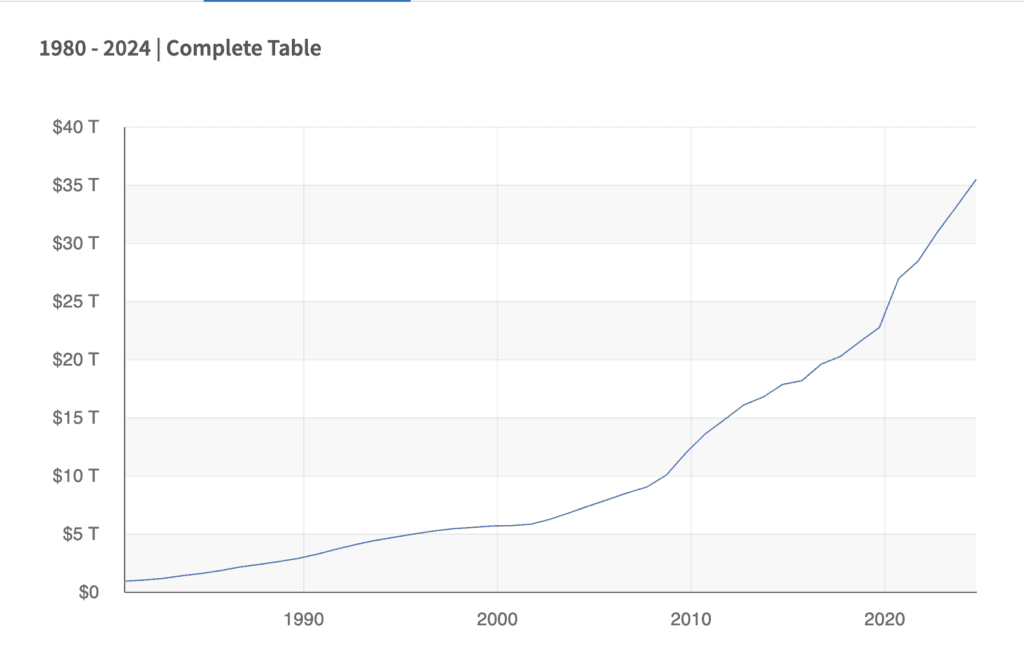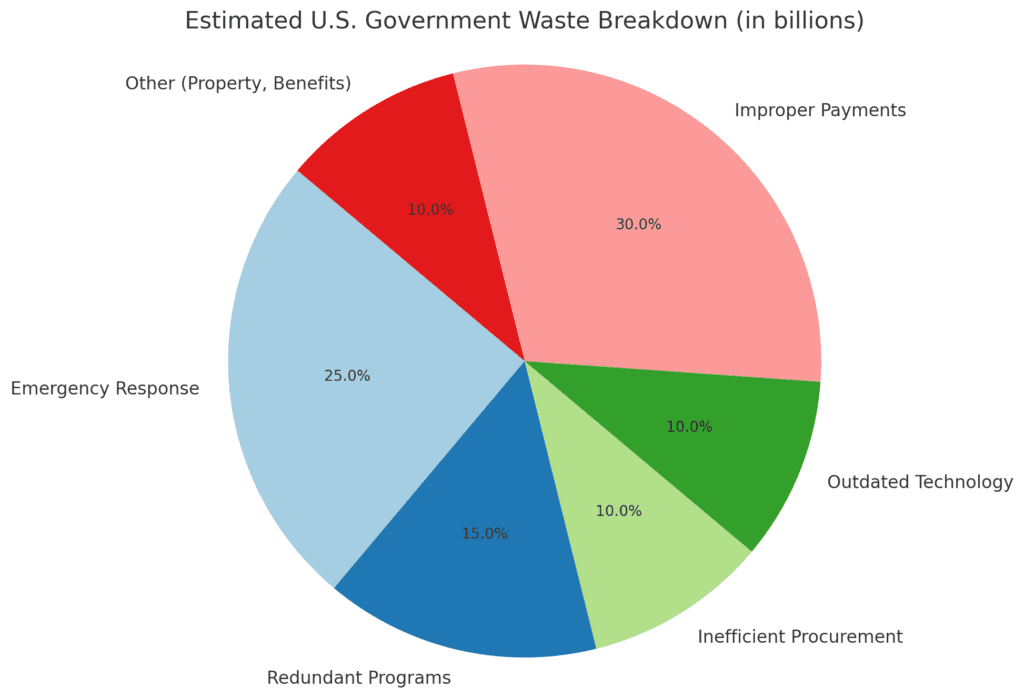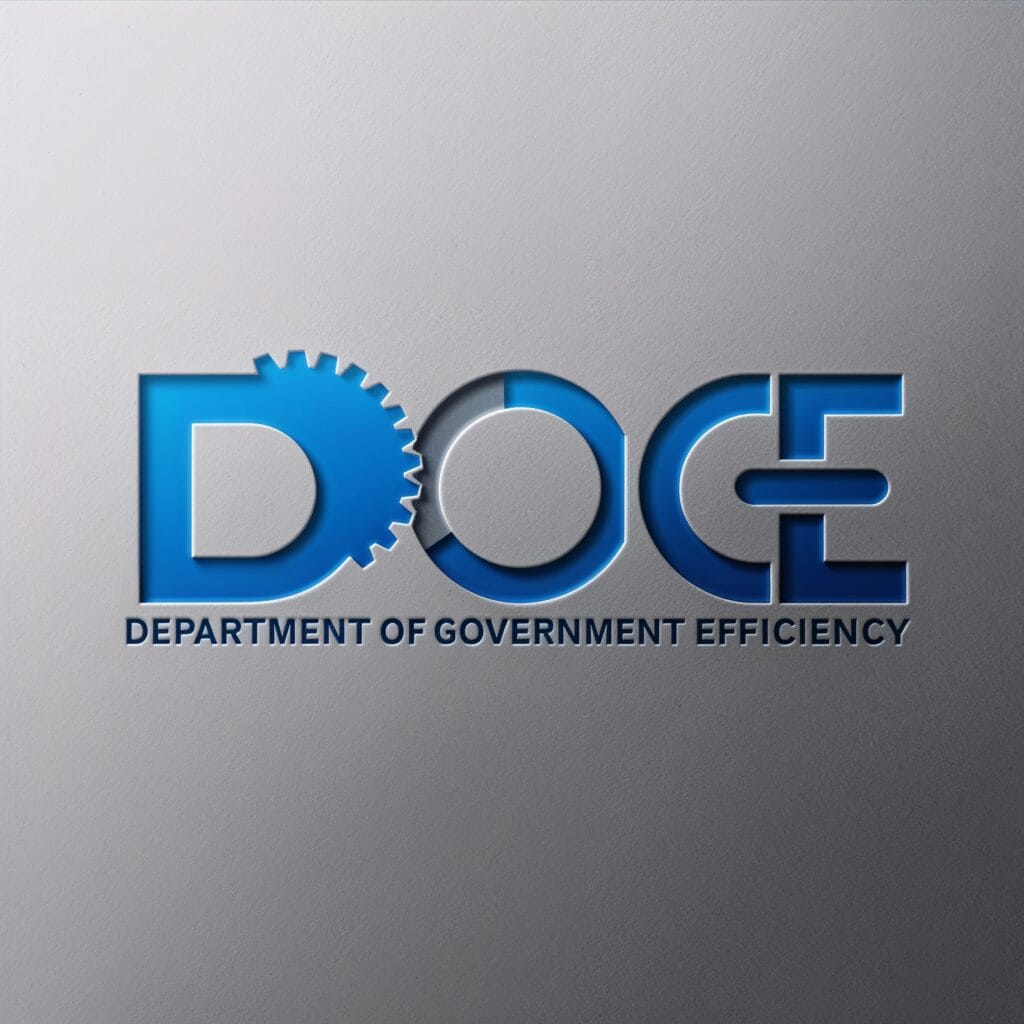
"Elon Musk depicted in a futuristic government setting, representing the Department of Government Efficiency, aimed at reducing waste and optimizing operations."
With the U.S. national debt now over $33 trillion, the nation faces a looming fiscal crisis. A Department of Government Efficiency could be the solution America needs to reduce waste and optimize taxpayer dollars. Interest payments alone are projected to surpass $1 trillion annually within the next decade, threatening to crowd out essential programs. Meanwhile, inefficiency costs taxpayers $125 billion annually, with billions more lost to redundant programs and outdated systems.
In a world where financial stability increasingly defines global power, the U.S. cannot afford to operate inefficiently. The solution? A Department of Government Efficiency, led by Elon Musk, who has a proven track record of transforming complex organizations through innovation and cost-cutting.
Check out: Trump’s Second-Term Cabinet Picks: The Team Shaping His New Administration
The U.S. Debt Crisis and the Case for a Department of Government Efficiency
U.S. national debt trend chart showing growth from $20 trillion in 2017 to over $33 trillion in 2023, based on U.S. Department of the Treasury data.
The U.S. government’s current spending trajectory is unsustainable, with deep implications for the economy, the dollar’s global status, and Americans’ quality of life.
The Debt Crisis is Real and Growing: The U.S. debt has exceeded 120% of GDP, a dangerous ratio that historically signals a country at risk of default or financial crisis during economic downturns. Without action, interest payments alone are expected to top $1 trillion annually, consuming a massive portion of federal revenue.
Inflation and Dollar Stability Are Threatened: Inflation in the U.S. surged to a 40-year high in 2022, reaching 9.1%, eroding purchasing power and putting financial strain on American households. At the same time, the BRICS coalition (Brazil, Russia, India, China, and South Africa) has intensified efforts to establish a dollar alternative, especially with support from China and Russia. This potential currency could weaken demand for the U.S. dollar, erode its reserve status, and ultimately drive up borrowing costs.
Consequences of Inaction: If we fail to curb spending, the U.S. could face an economic crisis marked by skyrocketing debt service costs, reduced funding for essential programs, and long-term consequences for future generations. A crisis of this scale would likely lead to sudden, drastic cuts to programs Americans rely on—forcing austerity rather than deliberate reform.
“Interest payments alone are expected to top $1 trillion annually—enough to crowd out essential programs and disrupt the economy.”

Billions Lost to Inefficiency: Why a Department of Government Efficiency Matters
Government inefficiencies are pervasive and costly, draining billions in taxpayer dollars that could be redirected to essential programs or debt reduction. According to the Government Accountability Office (GAO), improper payments alone cost taxpayers $125 billion each year, and nearly $2 trillion has been lost since 2003 due to errors, duplication, and outdated systems. This waste takes several costly forms:
Redundant Programs Costing Billions
- Workforce Development: Over 40 different federal programs across multiple agencies provide workforce development and job training, creating administrative bloat and redundant spending.
- Food Assistance Programs: More than 18 federal programs offer food assistance with separate eligibility requirements, resulting in high overhead costs. Streamlining these programs could reduce costs and improve service.
- Homeland Security and Emergency Preparedness: Agencies like FEMA, the Department of Homeland Security, and state agencies often duplicate efforts, leading to wasteful spending and inefficient disaster response.
The Cost of Inefficient Procurement and Overruns
- Department of Defense (DoD): Procurement inefficiencies in the DoD lead to approximately $25 billion in excess costs annually. For example, the F-35 fighter jet program has seen major cost overruns due to delays and poor contract management.
- VA Medical Supplies: Limited supplier competition has caused the Department of Veterans Affairs to overpay for medical supplies. Consolidating suppliers could save millions annually.
- Infrastructure Projects: Federal infrastructure projects, like highways and bridges, see inflated costs due to outdated bidding processes and lack of contractor accountability, costing taxpayers millions.
Outdated Technology: $90 Billion in Maintenance for Legacy Systems
- Social Security Administration (SSA): The SSA’s 60-year-old legacy system requires costly maintenance, and modernizing it could reduce annual costs significantly.
- Department of Veterans Affairs (VA): The VA’s outdated electronic health records system faces costly delays and modernization overruns, amounting to an estimated $2.7 billion in overruns as of 2021.
- IRS Tax Systems: The IRS relies on technology from the 1960s, incurring high maintenance costs and processing delays. Modernizing could improve efficiency and save millions.
“$125 billion is lost each year to improper payments—enough to fund essential programs without increasing taxes.”

Why Musk’s Efficiency-Driven Success is Ideal for a Department of Government Efficiency
Elon Musk has transformed every industry he’s entered by cutting costs, maximizing efficiency, and achieving what others thought impossible. Here’s why he’s the ideal candidate to lead a Department of Government Efficiency:
- Twitter Restructuring: After acquiring Twitter, Musk slashed 75% of the workforce and cut unnecessary departments. The platform continued to function smoothly, proving that streamlining operations could significantly reduce costs without sacrificing core functionality.
- SpaceX: By developing reusable rockets, Musk reduced space launch costs by over 90%, achieving the same mission objectives at a fraction of NASA’s expenses. His approach to cost-effective innovation could revolutionize government sectors like defense.
- Tesla’s Lean Manufacturing: Musk transformed Tesla into a manufacturing powerhouse, using automation and streamlined processes in gigafactories to cut waste and increase productivity. A similar model could make government operations more efficient, enabling faster, lower-cost services.
- The Boring Company’s Tunneling Efficiencies: Musk’s startup slashed tunneling costs through automation and minimalist designs, completing projects faster and under budget. Government infrastructure projects, often plagued by delays and overruns, could benefit immensely from Musk’s cost-cutting philosophy.
“Elon Musk’s efficiency-driven approach saved Twitter millions without sacrificing functionality—a potential model for government reform.”
How a Department of Government Efficiency Could Save Billions
A Department of Government Efficiency, led by Musk, could focus on three major areas to achieve significant savings:
- Administrative Efficiency: The federal government spends over $200 billion annually on administrative costs. Through automation, Musk could streamline these processes, reducing the need for manual labor and cutting costs across departments.
- Energy Efficiency: Government buildings consume around $6 billion in energy each year, and Musk’s expertise in renewable energy could lead to a transition that would cut these costs by 25-30%, reducing expenses while enhancing sustainability.
- Procurement and Contracts: Federal procurement, especially in defense, is fraught with inefficiencies and inflated costs. The Department of Defense’s $842 billion budget could benefit from Musk’s cost-conscious negotiation approach, promoting transparency and driving down prices through competitive bidding.
“A Musk-led efficiency initiative could cut federal spending by up to $100 billion annually.”

Conclusion: A Radical Solution for a Radical Problem
The U.S. debt crisis demands immediate, transformative action. By establishing a Department of Government Efficiency—and appointing Elon Musk as its leader—America could reverse its fiscal decline, modernize federal spending, and set a new standard for accountability and innovation.
With an entrepreneur known for cutting costs and breaking barriers, this department could be the catalyst for a more secure economic future. The time to act is now, before the cost of inaction becomes insurmountable.comes insurmountable.
DARWIN’s Take
Could a government agency truly operate with the relentless focus of a private-sector innovator? Or would bureaucracy resist even the most radical reformer? As debt mounts and efficiency wanes, Americans deserve a government that values accountability and innovation. Elon Musk might just be the catalyst capable of making that vision a reality.
Call to Action: Join the Conversation
What do you think—could a Department of Government Efficiency, led by someone like Elon Musk, really address the scale of waste in government? Share your thoughts below: Do you support the idea? What other changes would you like to see?
Recommended Reading on Paranoid Prophet
Explore these related articles from our Politics category to dive deeper into the themes of national division and political dynamics in the U.S.:
- Trump’s Rally Record: How His Campaigns Stack Up Against Other U.S. Politicians’ Rallies
Discover how political rallies shape public opinion and contribute to national unity or division. - What to Expect: Trump’s Likely Moves from Election Win to Inauguration
Analyze the strategies and implications of political maneuvers during transitional periods. - Pete Hegseth as Secretary of Defense: How His Leadership Could Reshape the Pentagon
Explore Pete Hegseth’s potential appointment as Secretary of Defense, his military background, and its implications for veterans’ care and defense policies. - Trump Tariffs for Mexico and Canada
Explore the economic and political impacts of Trump’s proposed 25% tariffs on Mexico and Canada. Learn how these tariffs could reshape trade dynamics, pricing, and North American manufacturing. - Marco Rubio: Why He’s a Poor Fit for Secretary of State
Explore why Marco Rubio’s neoconservative and hawkish stance could make him unsuitable as Secretary of State, analyzing its potential impact on U.S. foreign policy and global diplomacy.
Hegseth VA Reform: Can Veterans Finally Get the Care They Deserve? - Assess Pete Hegseth’s proposed VA reforms and their potential to improve healthcare services for veterans, addressing longstanding systemic issues.
Pete Hegseth as Secretary of Defense: Future Impact to the Pentagon - Analyze the implications of appointing Pete Hegseth as Secretary of Defense, focusing on prospective changes within the Pentagon and defense policies.
- Matt Gaetz Human Trafficking Allegations: Media Smear Campaign or Manufactured Scandal?
Investigate the human trafficking allegations against Matt Gaetz, exploring whether they constitute a media smear campaign or a manufactured scandal. - RFK Jr.: A Game-Changing Nominee for Secretary of Health and Human Services
Examine the potential impact of RFK Jr.’s nomination as Secretary of Health and Human Services, considering his views on public health and policy reform. - Why America Needs a Department of Government Efficiency—and Why Elon Musk Should Lead It
Discuss the necessity of a Department of Government Efficiency in the U.S. and propose Elon Musk as a visionary leader to spearhead governmental innovation. - Mail-In Ballots and Election Fraud: Risks, Safeguards, and 2024 Concerns
Investigating how electoral policies affect national trust, including how they intersect with issues affecting the military and veterans.
FAQ
1. Why is government efficiency important for reducing the national debt?
Government efficiency is critical to reducing the national debt because it eliminates unnecessary spending and redirects resources to essential programs. By cutting inefficiencies, wasteful practices, and redundant systems, the government can lower costs and address the growing debt crisis without additional taxpayer burdens.
2. How does government inefficiency increase wasteful spending?
Government inefficiency contributes to wasteful spending through improper payments, overlapping programs, and outdated systems. These issues cost taxpayers an estimated $125 billion annually. Streamlining operations can save billions and enable better use of public funds.
3. Can Elon Musk’s business strategies improve government efficiency?
Yes, Elon Musk’s business strategies—like automation, lean operations, and innovative problem-solving—can improve government efficiency. Applying these principles to federal agencies could enhance productivity, reduce costs, and modernize outdated systems.
4. What challenges might arise in creating a Department of Government Efficiency?
Challenges in establishing a Department of Government Efficiency include bureaucratic resistance, political opposition, and the complexity of overhauling entrenched systems. Strong leadership and a clear mandate are essential to overcoming these hurdles.
5. How much does outdated technology cost the federal government annually?
Outdated technology costs the federal government approximately $90 billion annually in maintenance and operations. Modernizing these systems can save billions while improving efficiency in critical services like the IRS and Social Security Administration.
6. How can federal agencies improve administrative efficiency?
Administrative efficiency in federal agencies can be improved by automating processes, reducing redundant roles, and adopting private-sector best practices to streamline workflows and enhance productivity.
7. What impact would energy efficiency have on government spending?
Implementing energy-efficient solutions in government buildings could reduce costs by up to 30%, saving taxpayers around $1.8 billion annually. Renewable energy initiatives could further cut expenses and promote environmental sustainability.
8. How significant are procurement inefficiencies in federal spending?
Procurement inefficiencies are a major contributor to waste, particularly in defense spending, where cost overruns and delays are common. Addressing these issues could save billions and improve project outcomes.
9. What role does the Department of Defense play in government inefficiency?
The Department of Defense (DoD) has one of the largest federal budgets and is prone to significant waste due to procurement inefficiencies and project mismanagement. Reforming DoD spending is critical to improving overall government efficiency.
10. How does consolidating federal programs reduce waste?
Consolidating overlapping federal programs eliminates redundancy, reduces administrative costs, and improves service delivery. Regular reviews by the GAO have shown that merging similar programs can save billions.
11. What are improper payments, and how do they affect government spending?
Improper payments are funds distributed incorrectly, often due to fraud or errors, costing taxpayers $125 billion annually. Reducing these payments is crucial for fiscal accountability.
12. How does government inefficiency impact everyday Americans?
Government inefficiency affects Americans by increasing taxes, reducing the quality of public services, and contributing to national debt. These issues lead to economic challenges like inflation and limited funding for critical programs.
13. Could privatizing government services improve efficiency?
In some cases, privatizing government services can increase efficiency by leveraging private-sector competition. However, careful oversight is needed to ensure public accountability and protect citizens’ interests.
14. What is the potential impact of modernizing IRS tax systems?
Modernizing IRS systems could reduce errors, speed up tax processing, and save millions annually in operational costs. Updated technology would enhance overall tax administration.
15. How does government efficiency relate to future tax increases?
Improved government efficiency can reduce the need for future tax increases by cutting waste and saving billions. These savings can fund essential programs without additional taxpayer burden.
16. Are there successful examples of efficiency reforms in government?
Yes, many state and local governments have implemented efficiency reforms, leading to cost savings and improved services. These successes demonstrate the potential for similar initiatives at the federal level.
17. How can citizens advocate for increased government efficiency?
Citizens can advocate for efficiency by contacting elected representatives, supporting transparency initiatives, and staying informed through reputable sources like the Congressional Budget Office (CBO) and the GAO.
18. What role does technology play in government efficiency?
Technology is a key driver of government efficiency, enabling automation, improved communication, and data-driven decision-making. Investing in modern technology reduces long-term costs and improves service delivery.
19. How do redundant federal programs impact the budget?
Redundant programs waste billions of dollars by duplicating services across agencies. The GAO estimates that addressing duplication and overlap could save substantial taxpayer funds.
20. What measures can prevent future government inefficiency?
Preventing future inefficiency requires strong oversight, regular audits, and the adoption of private-sector best practices. Transparency and accountability policies are essential for sustainable reform.


